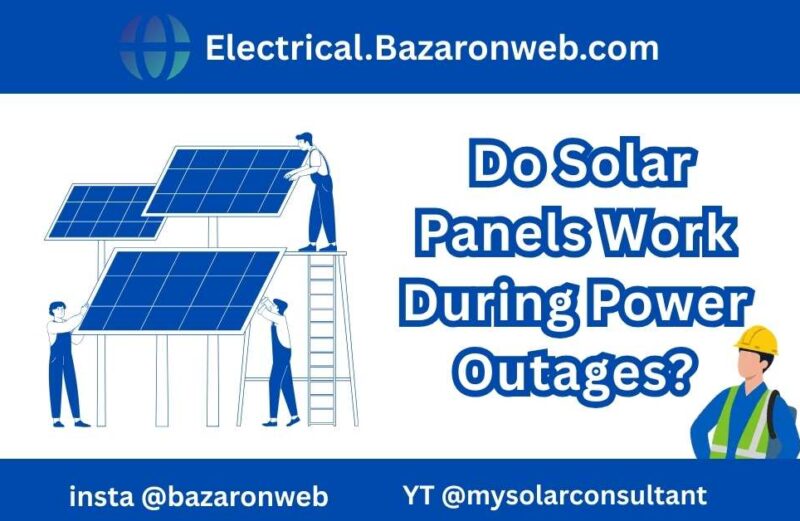By Sudeep S – Electrical Engineer & Solar Expert
One of the most common questions I get from homeowners is:
“If I have solar panels, will my lights stay on during a power outage?”
It’s an important question, especially in the USA where storms, grid failures, and extreme weather can leave families without electricity for hours—or even days. Many assume that solar panels automatically provide backup power. The reality is a bit more technical. Let me break it down clearly for you.
1. How Solar Panels Work Under Normal Conditions
To understand solar performance during outages, you first need to know how your system functions when the grid is up.
- Solar panels generate direct current (DC) power from sunlight.
- An inverter converts that DC into alternating current (AC), which powers your home.
- If your panels generate more electricity than you need, the extra flows into the utility grid, earning you credits (via net metering).
- At night or when your panels don’t produce enough, you draw from the grid.
So in most cases, your solar system is grid-tied, meaning it’s connected to and dependent on the utility grid.
2. Why Grid-Tied Solar Shuts Down During Outages
Here’s the surprising truth: most rooftop solar systems automatically shut off during a power outage.
Why? For safety reasons. If the grid goes down and your system continues pushing electricity into the lines, it could endanger utility workers trying to repair them. This is known as “anti-islanding protection.”
So unless you have a battery backup system or special inverter setup, your solar panels won’t power your home during an outage—even on a sunny day.
3. How to Keep the Lights On During Outages
If you want solar to protect you during blackouts, you’ll need additional equipment. Here are the main options:
✅ Solar + Battery Storage
- With a battery (like Tesla Powerwall, LG Chem, or Enphase), your panels can store excess daytime energy.
- During a blackout, your home automatically switches to battery power.
- The solar panels keep charging the battery during the day, extending your backup time.
- Perfect for running essentials like refrigerators, lights, Wi-Fi, and medical equipment.
Downside: Adds $8,000–$12,000 per battery to your installation cost.
✅ Hybrid Inverters with Backup Mode
- A hybrid inverter can isolate your home from the grid during outages.
- It allows solar panels to keep producing power while feeding a dedicated backup circuit in your home.
- Some hybrid systems work without batteries but typically provide limited backup.
✅ Off-Grid Solar Systems
- An off-grid system is completely independent from the utility.
- Solar panels charge a battery bank, and your home runs entirely off stored power.
- Provides 24/7 independence but requires large batteries and is more expensive to maintain.
- Not practical for most suburban homes but ideal in rural areas with no utility access.
4. How Long Can Solar + Batteries Power a Home?
This depends on your system size and energy use. Let’s look at an example:
- Typical U.S. home daily use: 25–30 kWh
- 1 Tesla Powerwall battery capacity: ~13.5 kWh
- One fully charged battery: Runs essential loads (fridge, lights, Wi-Fi, fans) for 12–24 hours
- With solar panels recharging during the day, you can extend power indefinitely—if the sun is shining.
If you want “whole-home backup” (running AC, water heater, and heavy appliances), you’ll need multiple batteries, which raises costs.
5. Financial Considerations
Here’s what you should expect:
- Solar without batteries: $12,000–$20,000 (after tax credit for typical home)
- Solar + one battery: $20,000–$30,000
- Solar + multiple batteries (whole-home backup): $35,000–$50,000+
For many families, the decision comes down to: Do I want solar just to save money on bills, or also for peace of mind during outages?
6. Situations Where Solar Backup Makes Sense
From my years in the field, I recommend solar + battery backup if:
- You live in an area with frequent power outages (e.g., hurricane or wildfire-prone regions).
- You have critical home equipment (medical devices, sump pumps, etc.).
- You want to maintain internet and lighting for remote work.
- You value energy independence and don’t want to rely on the grid.
If outages are rare in your area, a grid-tied system without batteries might be sufficient—saving you money upfront.
7. Future Outlook: Solar + Storage Is Growing
Battery technology is improving quickly. Costs are dropping, efficiency is rising, and many states now offer incentives for battery storage in addition to solar panels.
In the coming years, I expect most solar systems in the USA to include at least one battery as standard. This will transform solar from just a “money saver” into a true energy security solution.
Final Thoughts as a Solar Engineer
So, do solar panels work during power outages?
- Without batteries: No, they shut off for safety reasons.
- With batteries or hybrid inverters: Yes, they can keep your home running.
As someone who has installed many residential and commercial solar plants, my advice is: think carefully about your energy needs. If your priority is savings on electricity bills, a grid-tied solar system will do the job. But if you want resilience, security, and uninterrupted power, invest in a solar + battery solution.
In today’s world of rising utility rates and unpredictable weather, the ability to generate and store your own clean power is not just convenient—it’s empowering.

